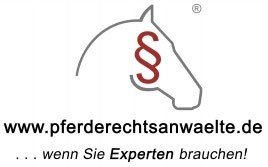Sie sind hier:

Animal liability: Dogs in a stable – who´s more dangeous?
Whenn horse law (equine law) and dog law clash
In most stable rules the following can be read: "Dogs must be kept on a leash." While the rule is very clear the enforcement is much less so. Some clubs meticulously enforce this rule, and any infringement will be sanctioned, while other stables disregard this rule. The former is not unnecessary harassment, the latter is a hazard for all parties.German law, like most other European legal systems, knows next to the fault-based liability in certain cases, a responsibility for endangering others even without any fault. This includes the "keeping of animals", esp. if "luxury animals" are involved. The keeper of the animal is responsible, and may be liable, for damages caused by the animal.
The keeper is the person, who can decide upon the animal, pays for it out of personal interest and bears the risk of its loss. As "luxury pet owners" are, for example, the private riders in terms of its sport horse or nonprofit riding club with regard to its own horses (BGH, judgment of 12.01.1982, VI ZR 188/80), as well as the private dog owners or cat owner. Luxury animals are those one keeps just for fun, so a sheepdog for the shepherd or the guard dog for a farmer is a working tool, and not luxuries.
In an animal based conflict the liability falls to the keeper of the animal only on the presumption that the damage was caused by an animal-specific behavior of the animal in question. The danger brought on by the animal must have materialized in such a way that is in the natural breadth of acting according to the nature of the animal. That animal being classified as unpredictable and independent in its actions (settled case since BGHZ 67, 129).
The risk of the luxury keeper is great, because he is also liable for any damage that he may be unable to prevent. The only requirement is that the animals risk occurred, no fault of the keeper it is necessary.
The victim on the other hand faces some reductions of his possible claims. In the case that the victim is not the one to blame for the damage then the liability, regardless of negligence or fault of the animal keeper, will be overruled. For example, if an free running dog is kicked by a horse, bitten by another dog, or hit by a car, then the dog owner has to take into account that he didn’t watch his dog closely enough and consequently, his claims against the owner of the harming animal or car - depending on the circumstances of the individual case - could be reduced to zero.
In a pack fight scenario with multiple involved parties, according to the LG Mainz, (file no. 3 S 8/04) or the OLG Frankfurt (judgment of 12.01.2007, 19 U 217/06) all dog owners are liable in equal parts for the damage caused. It does not matter which individual dog caused the damage. To third parties all the keepers are liable together when their animals as a kind of herd or pack that form a single obstacle (OLG Saarbrücken, judgment of 17.01.2006, 4 U 615/04) or mutually create a growing danger.
As a keeper of animals one must been concerned with the custody of the animal taking reasonable precautions to prevent the animal breaking out of an enclosure and escaping to run free esp. by skipping, undermining or biting. Lack or inability to maintain custody of an animal and the animal thereafter causing injury or damage can even go as far as a criminal sentence for the keeper. Once, a dog owner couldn’t control his impatient dogs while crossing a street off the leash, so they rushed across the road too quickly and collided with a cyclist. The cyclist then crashed and suffered serious head injuries which ultimately he died of. The dog owner was found guilty of involuntary manslaughter and was fined € 2,500 (OLG Stuttgart - 2 Ss 94/04).
The OLG Saarbrücken, judgment of 14.07.2005, 8 U 283/04, decided a case in which a pack of dogs and a horse worked together quite unluckily and a man fell by the wayside. The court noted that a pack of dogs is regularly a typical animal hazard even without aggressive behavior. But in the special situation where a horse is startled, the fallen horse owner may have to bear his loss alone, because a pet owner’s responsibility for any other party’s animals withdraws entirely.
As these many different cases and scenarios have demonstrated the ruling of liability in cases involving luxury animals quite often falls upon the keeper of the animal, but with many factors at play it can be quite case-by-case. That said, if the stable rule clearly states “dogs must be kept on a leash” then, no matter how well that rule is enforced, the dog owner risks carrying a higher fault proportion of an accident. As well as the risk of not getting the injuries of their own dog covered. A rule is a rule and disobeying the rules is a fault that enlarges the own share in the damage done.
Note: You may copy this article without changes for private use or for internal use, giving my contact details. For commercial use, the prior consent of the author must be obtained. Please send a specimen copy or the direct link.
AG = Amtsgericht = local court
LG = Landgericht = district court
OLG = Oberlandesgericht = higher regional court
BGH = Bundesgerichtshof = german high court
















